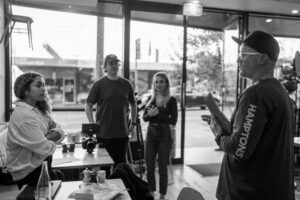
Following on from part one, filming Interviews is an art, requiring skill and style. Many times I’ve watched people sit in the interviewer’s seat and simply read questions from a piece of paper or device. On the other hand, I’ve seen interviewers bamboozle their interviewee with endless direction. If you want to write and deliver effective interview questions then we’ve got you covered. Here are some insights into effective interview questions, drawn from my experience in television, corporate media, and Psychology studies.
Effective Interview Questions Avoid Assumptions.
Not only do assumptions put words in people’s mouths, avoiding them puts the onus on the interviewee when it comes to communicating content. Interviewees are more likely to give a passionate and convincing response if you don’t set the premise that you already know the answer. For example: ‘Why is this business important to you?’ vs ‘Talk to me about whether this business is important to you’. With the latter, the interviewee has to communicate that they see the business as important. With the former, they understand you already know it is important to them, thus they don’t need to convince you of it in their response.
Prepare, but be prepared for spontaneity.
It’s good to be really familiar with the content. Come with solid written ideas about what you want to ask and the question order. We’ve all witnessed or experienced an interviewer not listening because they are too busy thinking about their next question. Preparedness helps avoid this issue. But, don’t be afraid to go off script either. You’ll miss opportunities if an interviewee raises an unexpected point, but you are so committed to your pre-prepared questions that you forgo the opportunity to explore new information.
Know the subject matter.
Familiarise yourself with terminology, context and history. Have at least a basic understanding of the business, industry, person or issue you are exploring. This is an area where you can leverage AI to your advantage. As a Producer I deal with varied and complex subject matter but don’t always have the luxury of spending days researching topics. So, I use tools like Chat GPT for distilling lengthy or complex information into succinct summaries that allow me to write effective interview questions.
Sometimes it’s helpful to conduct a pre-interview, especially if a long narrative is involved. In my opinion, it’s best to have someone else conduct the pre-interview. Or have the interviewee fill out a questionnaire and then get it summarised. This allows you to be across the key points (and therefore not miss anything), but leaves room for discovery and surprise. Keep pre-interviews top-level and brief because people often give their best answers the first time. Especially in biographical or personal interviews, don’t over-learn about what they’ll say. Let yourself be genuinely surprised because that will generate better rapport and flow.

Effective interview questions are open ended .
This is something most of us know, but in practice it’s hard to do. A close ended question draws out a usually short and always finite response. For example: ‘How many years have you worked here?’’, ‘Nine’. Here’s an example of an open-ended question – ‘Having worked here for a decade, how would you describe your experience as a long-term employee?’ The answer could take any length and direction; it requires an informative, personal and nuanced response. However, close ended questions do have their place. Their answers usually won’t make the final edit, but they can be good preamble for open ended questions.
Train interviewees to reframe the question in their answer.
In corporate video the interviewer is usually ‘off-screen’, meaning their questions aren’t heard by the viewers. You need to give the interviewee an example of the responses you are after. Let’s look at an example question: ‘Can you talk to me about whether you enjoy working here?’. The answer could be ‘I enjoy working at — because of the environmental impact’ rather than ‘I enjoy the environmental impact.’ With the latter audiences don’t know what the person is referring to.
If interviewees struggle with this, I don’t like to push the point too hard because it can undermine confidence and distract focus from the content. You also don’t want them to be simply repeating the question in a ‘wooden’ manner. Many times where interviewees haven’t included the question in their answer, I let it slide because I sense correcting them would a distraction. There are options for getting around this issue other than calling interviewees out on their mistake.
When conducting filmed interviews, think like an editor. If you can identify a start point where the answer could be cut into edit, then don’t worry about correcting whatever came before that point. You could also use question slides or voiceover to communicate the question in the edit. If there are multiple interviewees answering the same question, putting someone else’s answer first also fixes the issue. Alternatively, let the interviewee give their uninterrupted answer and afterwards ask them to redeliver the first sentence with the question in it. The two responses be pasted together in the edit.

Don’t ask double barrelled questions.
This means don’t ask more than one thing at a time. Let the interviewee answer, if they haven’t addressed everything that you’re interested in hearing, then use follow-up questions. Instead of ‘Tell me why you started working here and what keeps you here’, start with ‘Tell me about what motivated you to start working here’. You can follow up with ‘That’s interesting – I’m curious to hear what is keeping you in the organisation today.’
For tips on establishing rapport when filming interviews look out for the third part of this blog series. If you’re not confident conducting interviews, or just feel it would be better done by an expert, contact our team. We can provide you with a great interviewer to bring the best out of your talent.
